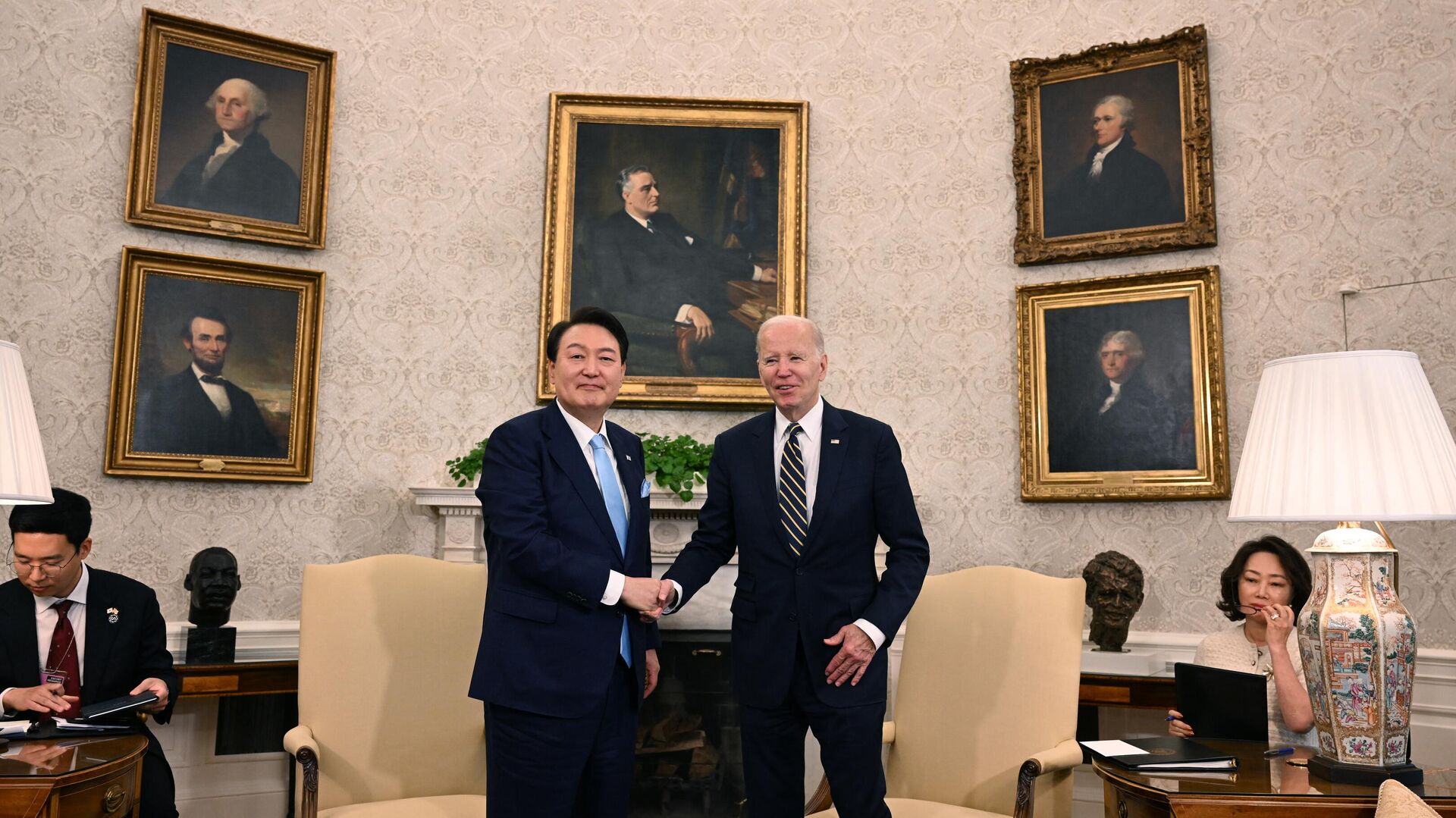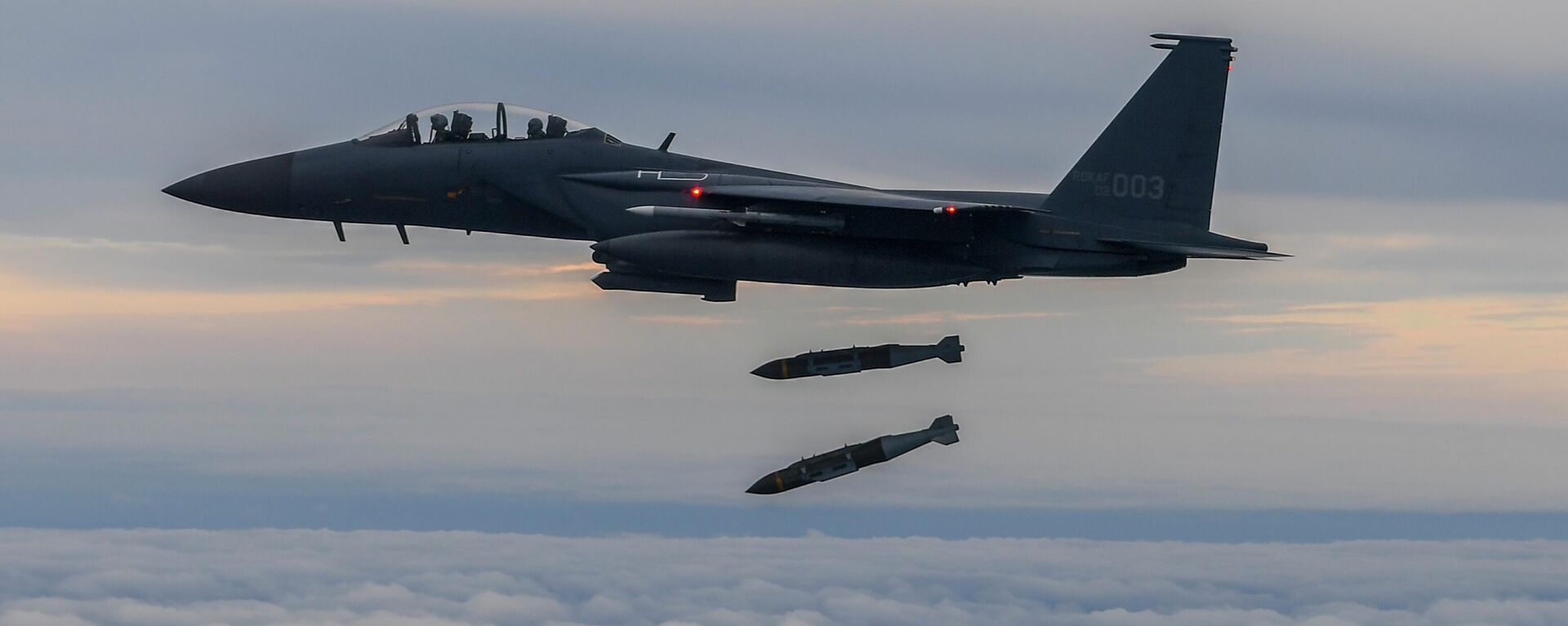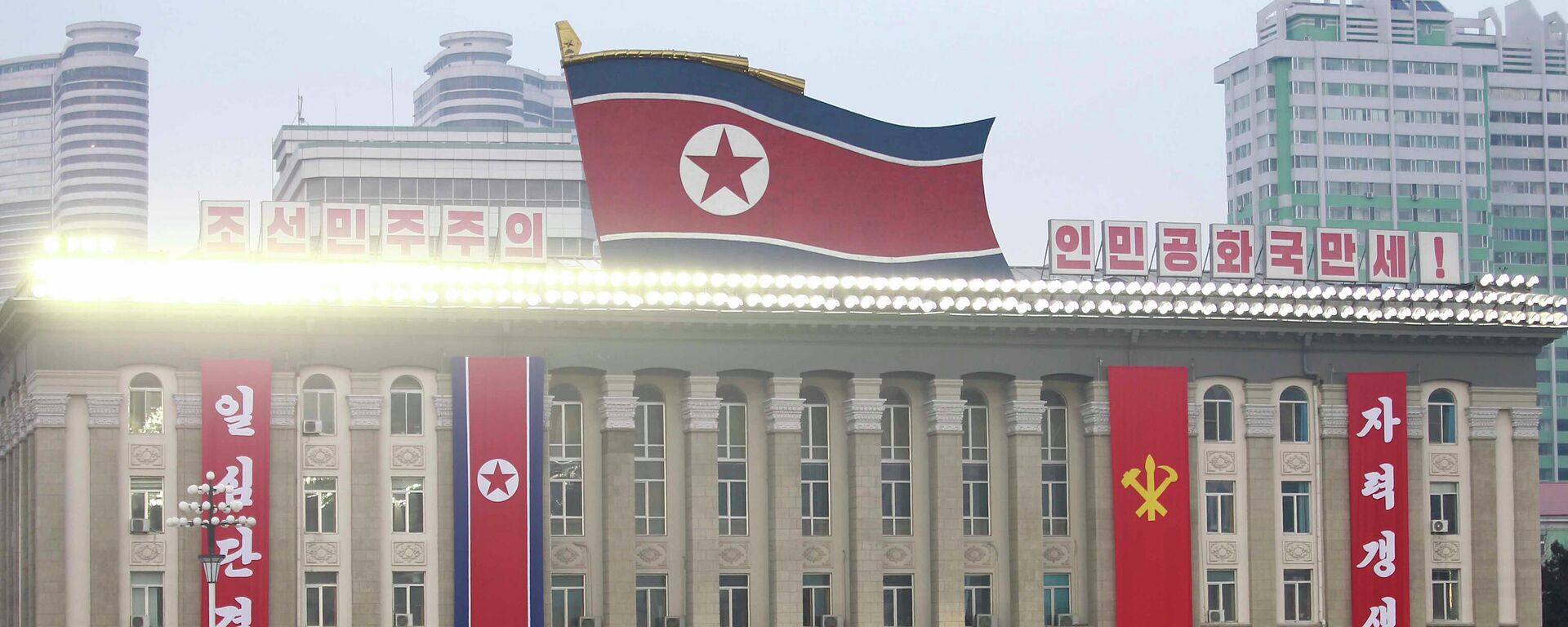https://sputnikglobe.com/20230506/us-s-korea-beyond-nuclear-sharing-agreement-may-escalate-tensions-to-brink-of--war-1110136085.html
US, S Korea 'Beyond Nuclear Sharing' Agreement May Escalate Tensions to 'Brink of War'
US, S Korea 'Beyond Nuclear Sharing' Agreement May Escalate Tensions to 'Brink of War'
Sputnik International
The Washington Declaration adopted during South Korean President Yoon Suk Yeol’s recent visit to the United States extends beyond "nuclear-sharing," a US administration official was cited as saying.
2023-05-06T06:48+0000
2023-05-06T06:48+0000
2023-09-18T13:34+0000
us
south korea
yoon suk yeol
joe biden
washington
nuclear
nuclear deterrence
asia
north korea
https://cdn1.img.sputnikglobe.com/img/07e7/05/06/1110135909_0:112:3241:1935_1920x0_80_0_0_96eba126e1bb4dd3ec9ed30c4354a764.jpg
The so-called Washington Declaration that was adopted during South Korean President Yoon Suk-yeol’s recent trip to the United States extends beyond "nuclear sharing," a US administration official was cited as telling a media report.The remarks feed into the debate triggered after the South Korean President's state visit to the US, where Yoon Suk-yeol had been met with much pomp to commemorate the 17th anniversary of the two countries' security alliance. Ahead of the visit, there had been speculations as to what manner of upgrade, so to say, might be offered for the reinforced US-ROK alliance, especially under the pretext of North Korea’s (DPRK) schedule of missile simulations and test firings.The most important outcome of the visit was the signing by the South Korean President and his US counterpart, Joe Biden, of the Washington Declaration. The deal provides for the establishment of a regular bilateral consultation mechanism called the US-South Korean Nuclear Consultative Group on extended deterrence and strategic planning. The Republic of Korea (ROK) also secured a US promise to promptly deploy "the entire force of the alliance," including nuclear weapons, in the event of a nuclear attack by North Korea. The US also promised to send nuclear missile submarines to the Korean Peninsula. Seoul, meanwhile, reaffirmed its nonproliferation obligations under the Nuclear Non-Proliferation Treaty (NPT).It should be clarified that "nuclear sharing" is a NATO deterrence concept, allowing member countries without nuclear weapons of their own to participate in planning for the use of nuclear weapons by the alliance. South Korea is not a NATO member. However, interpretation of the term had opened up a debate in the wake of Yoon Suk-yeol's Washington foray. ROK's deputy national security adviser, Kim Tae-hyo, had openly enthused:But a Biden administration official was quick to wade in with clarifications. Edgard Kagan, special assistant to the president and senior director for East Asia and Oceania of the National Security Council (NSC), said that the Washington Declaration was not a "nuclear-sharing" arrangement. He said the declaration emphasized America's commitment to consult with South Korea on any possible nuclear weapons employment on the Korean Peninsula. North Korea railed against the Washington Declaration and agreement to bolster the deployment of US strategic assets in the region. The deal served to escalate tension to the "brink of a nuclear war," state media KCNA said on Monday.The visit of the South Korean President to the United States was slammed as a provocation and a display of hostile policy regarding Pyongyang.North Korean President Kim Jong-un's sister, Kim Yo Jong, who serves as a deputy head of the Central Committee of the ruling Workers’ Party, also denounced the Washington Declaration as deteriorating global safety.Moscow is also convinced that such further actions of the collective West will result in nothing but tensions escalation by provoking an arms race.
https://sputnikglobe.com/20230428/moscow-us-south-korea-joint-nuclear-agreement-destabilizes-situation-in-region-world-1109916658.html
https://sputnikglobe.com/20230430/pyongyang-deplores-south-korean-presidents-visit-to-us-accuses-sides-of-provoking-war-1109984589.html
south korea
washington
north korea
Sputnik International
feedback@sputniknews.com
+74956456601
MIA „Rossiya Segodnya“
2023
News
en_EN
Sputnik International
feedback@sputniknews.com
+74956456601
MIA „Rossiya Segodnya“
Sputnik International
feedback@sputniknews.com
+74956456601
MIA „Rossiya Segodnya“
us, south korea, washington declaration, nuclear sharing, beyond nuclear sharing, more fundamental goals, south korean president, yoon suk yeol, visit to the united states, a joint approach to military planning, operating in nuclear contingencies, new exercises and simulations, to improve operational readiness,
us, south korea, washington declaration, nuclear sharing, beyond nuclear sharing, more fundamental goals, south korean president, yoon suk yeol, visit to the united states, a joint approach to military planning, operating in nuclear contingencies, new exercises and simulations, to improve operational readiness,
US, S Korea 'Beyond Nuclear Sharing' Agreement May Escalate Tensions to 'Brink of War'
06:48 GMT 06.05.2023 (Updated: 13:34 GMT 18.09.2023) The South Korean President Yoon Suk-yeol’s visit to the US on April 24-29 to meet with President Joe Biden resulted in the adoption of the Washington Declaration that provides for the establishment of a regular bilateral consultation mechanism called the US-South Korean Nuclear Consultative Group on extended deterrence and strategic planning.
The so-called Washington Declaration that was adopted during
South Korean President Yoon Suk-yeol’s recent trip to the United States extends beyond "nuclear sharing," a US administration official was cited as telling a media report.
"The declaration moves beyond what could be characterized as nuclear sharing ... to address the more fundamental goal of developing a joint approach to military planning for, and operating in, nuclear contingencies, including through new exercises and simulations to improve operational readiness," the unnamed official said.
The remarks feed into the debate triggered after the South Korean President's state visit to the US, where Yoon Suk-yeol had been met with much pomp to commemorate the 17th anniversary of the two countries' security alliance. Ahead of the visit, there had been speculations as to what manner of upgrade, so to say, might be offered for the reinforced US-ROK alliance, especially under the pretext of North Korea’s (DPRK) schedule of missile simulations and test firings.
The most important outcome of the visit was the signing by the South Korean President and his US counterpart, Joe Biden, of the
Washington Declaration. The deal provides for the establishment of a regular bilateral consultation mechanism called the US-South Korean Nuclear Consultative Group on
extended deterrence and strategic planning. The Republic of Korea (ROK) also secured a US promise to promptly deploy "
the entire force of the alliance," including nuclear weapons, in the event of a nuclear attack by North Korea. The US also promised to send nuclear missile submarines to the Korean Peninsula. Seoul, meanwhile, reaffirmed its nonproliferation obligations under the Nuclear Non-Proliferation Treaty (NPT).
It should be clarified that "nuclear sharing" is a NATO deterrence concept, allowing member countries without nuclear weapons of their own to participate in planning for the use of nuclear weapons by the alliance. South Korea is not a NATO member. However, interpretation of the term had opened up a debate in the wake of Yoon Suk-yeol's Washington foray. ROK's deputy national security adviser, Kim Tae-hyo, had openly enthused:
"Going forward, our citizens will de facto feel as if we are sharing nuclear weapons with the US.”
But a Biden administration official was quick to wade in with clarifications. Edgard Kagan, special assistant to the president and senior director for East Asia and Oceania of the National Security Council (NSC), said that the Washington Declaration was not a "nuclear-sharing" arrangement. He said the declaration emphasized America's commitment to consult with South Korea on any possible nuclear weapons employment on the Korean Peninsula.
“So let me just be very direct. I don’t think that we see this as a de facto nuclear sharing,” said Kagan.
North Korea
railed against the Washington Declaration and agreement to bolster the deployment of US strategic assets in the region. The deal served to escalate tension to the "brink of a nuclear war," state media KCNA said on Monday.
The visit of the South Korean President to the United States was slammed as a provocation and a display of hostile policy regarding Pyongyang.
"This trip, aimed to draw up a sinister plan between the master and the stooge to annihilate the DPRK [North Korea], is the most hostile, aggressive and provocative, dangerous trip for a nuclear war... The 'Washington Declaration' on raising the practicality of the 'extended deterrence' provided by the US is a typical product of the heinous hostile policy towards the DPRK," said North Korean media.
North Korean President Kim Jong-un's sister, Kim Yo Jong, who serves as a deputy head of the Central Committee of the ruling Workers’ Party, also denounced the
Washington Declaration as deteriorating global safety.
Moscow is also convinced that such further actions of the collective West will result in nothing but
tensions escalation by provoking an arms race.
"This development of events is clearly destabilizing in nature and will have serious negative consequences for regional security with a projection on global stability," Russian Foreign Ministry spokeswoman Maria Zakharova said on Friday.




